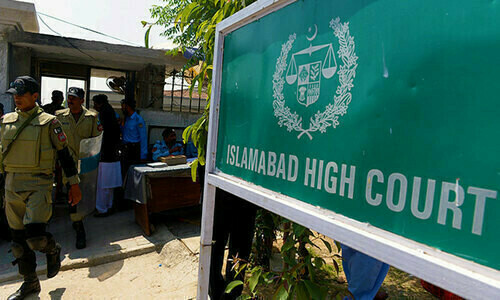THE State Bank’s decision to increase its benchmark rate by 300bps to 20pc, the highest since 1996, was expected and is part of several other actions that the government has undertaken in the last two days to fulfil the promises it had made to the IMF for its loan but was reluctant to follow up on.
The government had set the stage for these actions during a briefing for journalists on Monday, during which some officials accused the IMF of moving the goalposts for Pakistan.
A day later, a surcharge on electricity bills was announced to finance the power-sector debt, as the SBP removed curbs on the exchange rate it had quietly reimposed after letting the rupee depreciate in January to pave the way for the IMF mission’s visit for restarting discussions on the stalled programme review.
These measures followed fiscal adjustments, including an increase in the standard consumption tax rate and excise duty, reduction in energy subsidies and cuts in government expenditure to meet the budget deficit target.
There seems to be some consensus that Pakistan cannot overcome its balance-of-payment crisis without IMF support. Yet ties with the Fund have deteriorated and the trust gap has widened ever since Ishaq Dar took the reins at the finance ministry.
Mr Dar continued to deviate from the programme path signed by his predecessor last summer. His overconfidence that he could secure enough financing from ‘friendly’ countries — enough to help the coalition through to the next elections — as a substitute for IMF dollars was misplaced. Not just that, he again digressed from the steps agreed with the IMF last month even before the staff-level agreement could be finalised.
Sadly, Mr Dar’s actions over the last five months have imposed a punishing cost on the people and the economy. Prices of goods and services have spiked by 31.5pc and are projected to surge further because of steep currency depreciation — the rupee lost over 9pc to the dollar in the interbank in the last two days — removal of subsidies and energy price adjustments, with little hope of let-up over the next couple of years. Factories are closing and jobs being lost. More industrial closures cannot be ruled out.
On the external front, the international rating agencies have downgraded Pakistan deeper into junk, with the nation’s dollar bondholders bracing for a potential default over dwindling reserves and scheduled debt payments. No one is willing to step up in a big way without the IMF on board.
As pointed out by the SBP, the early conclusion of the ongoing review under the IMF funding programme is critical to “address near-term external sector challenges”. But for that to happen the government and its chief finance manager will have to put aside their egos. They may have no other option.
Published in Dawn, March 3rd, 2023














































Dear visitor, the comments section is undergoing an overhaul and will return soon.